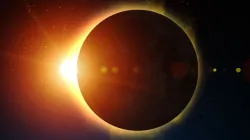Total Solar Eclipse 2024: Know when, where and how to watch Surya Grahan live online in India
Experience the awe-inspiring phenomenon of the Total Solar Eclipse 2024 live from India. Know the optimal viewing locations, timing, and online streaming options to witness the celestial event of Surya Grahan with ease and excitement.

Cosmic lovers all over the world are enthralled as an astronomical phenomenon unfolds, captivating skywatchers with the arrival of a total solar eclipse over North America on April 8. This celestial event will transform daylight into darkness, offering a dramatic spectacle visible from select locations. Such occurrences are rare, earning the chance to witness an eclipse the moniker of a once-in-a-lifetime opportunity.
What is a Solar Eclipse?
A solar eclipse occurs when the Moon passes between the Earth and the Sun, causing the Sun's light to be either completely or partially blocked. When the moon completely obscures the sun, it creates a shadow on Earth, known as the "path of totality." This path is a narrow band that moves across the Earth's surface.
Observers within this band can experience a total solar eclipse, provided that weather conditions permit. Within the path of totality, where the Moon entirely covers the Sun, the sky darkens, resembling either dawn or dusk. However, for those outside the path of totality, the experience transforms into a partial eclipse, where the Sun appears only partially obscured, lending a mysterious hue to the daytime sky.
Total Solar Eclipse: Is it visible in India?
According to NASA, residents of India will unfortunately miss out on viewing the Total Solar Eclipse of 2024, as it is set to grace the skies of North America. The US space agency announced that the eclipse, also known as Surya Grahan, will be observable in several countries, including the United States, Canada, Mexico, and various other parts of North America. “On April 8, 2024, a total solar eclipse will cross North America, passing over Mexico, the United States, and Canada," NASA stated on its website.
Total Solar Eclipse: Date and Timings
The total solar eclipse of 2024 will commence its celestial dance at 9:12 pm IST on April 8, with totality casting its enchantment from 10:08 pm to 2:22 am IST on April 9, 2024. The journey of darkness will commence on the Pacific coast of Mexico around 11:07 am PDT, bidding adieu to Maine by approximately 1:30 pm PDT.
Total Solar Eclipse: Duration
While the entire event spans over two and a half hours, the pinnacle of excitement lies within the fleeting moments of totality, lasting a mere four minutes. NASA predicts a peak totality duration, promising an experience nearly double the duration of its predecessor. "The duration of totality will be up to 4 minutes and 27 seconds, almost double that of The Great American Eclipse of August 21, 2017," according to Great American Eclipse.
Total Solar Eclipse: How To Watch It Online?
If you're unable to witness the solar eclipse in person, fret not, as you can catch the celestial spectacle via live stream. NASA will commence its live stream on April 8, starting at 5:00 pm GMT (10:30 pm IST), and concluding at 8:00 pm GMT (1:30 am IST). Throughout the broadcast, NASA will engage viewers with expert discussions and provide telescope perspectives from various locations along the eclipse's path.
Furthermore, the McDonald Observatory in Texas will host its live stream of the event. Additionally, skywatching enthusiasts can tune in to timeanddate.com's YouTube channel, where the total solar eclipse will be streamed live starting at 4:30 pm GMT (10:00 pm IST) on April 8.
Total Solar Eclipse: How To Safely View?
The intensity of the Sun's surface is such that even a small portion of direct exposure can result in damaging individual retinal cells. To safeguard your eyes, astronomers worldwide recommend wearing protective eyewear, such as certified eclipse glasses, especially during the partial phases of the event. Failure to take this precautionary measure may lead to retinal burns and potentially permanent vision impairment or blindness.
ALSO READ: Know 7 reasons why Indians add one-rupee coin in money gifting
